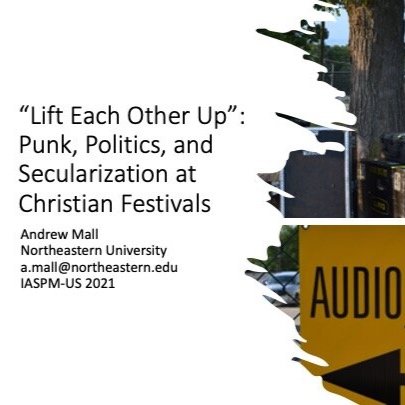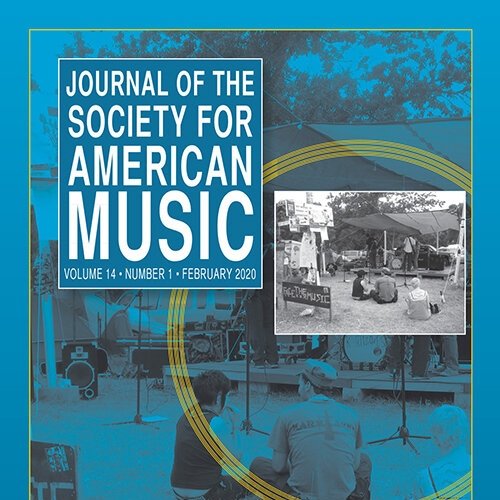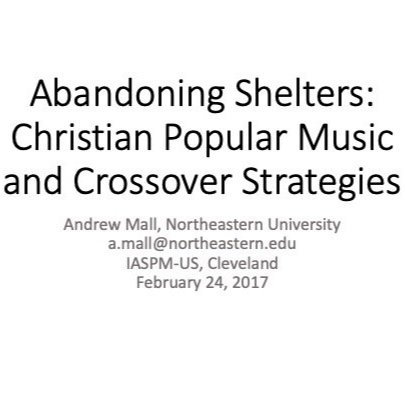
An international Christian rock star was accused of sexual assault. Will this affect the Christian music industry?
NGN (2025). Allegations of sexual misconduct have hit the Christian music community. At least five men accused internationally known Christian musician Michael Tait of sexual assault, in what Andrew Mall, associate music professor at Northeastern University, called “the highest-profile case” he’s seen in this section of the music industry.

Rock That Doesn’t roll, “Bookstore Guys”
Rock That Doesn’t Roll podcast (2023). Who could a 1990s Christian rock aficionado turn to in order to find the latest and greatest releases? For mainstream music fans, tastemakers included record store clerks of 1990s indie music stores, or retail juggernauts like Tower Records and Wherehouse - the kind of superfans depicted by Jack Black in High Fidelity. But for many evangelical teens of the 1990s, record stores were not the place to find kid-tested, parent-approved music. For that, Christian teens usually had to go to Christian bookstores.

Author Meets Critics: Andrew Mall’s God rock, Inc.
AAR (2023) “author meets critics” panel on God Rock, Inc. Panelists will consider how Christian music as a niche business shapes religious communities in the United States (and beyond), as well as how its many genres and subgenres - pop, rock, metal, rap, hip hop, praise and worship, etc. - reflect and shape evangelical Christian politics, practice, and theology.

Collaborative Ethnography at Furnace Fest: Initial Findings on Affect, Community, and Commerce in Hardcore
Colloquium presentation (2022). At Furnace Fest (Birmingham, Alabama), attendees travel from across the U.S. and Canada for three days of emo, hardcore, metal, and punk performances. Based on ongoing fieldwork, in this talk I consider what my research collaborators and I have learned so far about working together—both in terms of our research methodologies and in terms of festival organizers and their communities.

Furnace Fest Community: A Public Conversation
Public research presentation (2022). Prior to Furnace Fest 2022, I helped organize a public conversation as part of an official pre-fest event. The plan was to present some of our initial research findings and moderate a public conversation with the participation of two of Furnace Fest’s organizers and one of the Furnace Fest Community moderators.

(Post-)Christian Hardcore, Community, and Nostalgia at Furnace Fest
Conference presentation (2022). At Furnace Fest 2021 (Birmingham, Alabama), attendees traveled from across the U.S. and Canada for three days of emo, hardcore, and metal performances. Based on ongoing, collaborative fieldwork in the Furnace Fest community, in this paper I build upon prior work that posits festivals as physical places for imagined communities (Mall 2015; cf. Anderson 1991 [1983]) and scenes (Mall 2020) to consider how music festivals, as sensational forms (Meyer 2009), substantiate musical community itself (see, e.g., Shelemay 2011).

Musicking the Right Way: Performing Ethics and/as Aesthetics at Christian Music Festivals
AMS conference presentation (2021). Cornerstone Festival performed its organizers’ ethics into being, witnessed in its do-it-yourself scrappiness, its (at times) overwhelming sonic chaos, its sanctioned attendee-operated “generator stages,” and its willingness to engage difficult theological questions. From one perspective, this reflects a tautological relationship between orthodoxy and orthopraxy grounded in theology; another perspective reveals the co-constitutiveness of ethics and aesthetics grounded in practice. To recast Jeffers Engelhardt’s “right singing,” at Cornerstone, if the performing was right, then the ethics expressed in that performing were right, and if the ethics were right, then the musical practices grounded in those ethics were right. In this paper, I draw on theories of music and ethics rooted in Christian musicking to generate a theoretical framework that situates these practices not within a shared faith but rather within a shared ethical framework irrespective of religious belief.

An Origin Story
When I was growing up, my family attended a Southern Baptist church in New Jersey. I was first introduced to Christian rock in the 1990s but didn’t start researching it until 2009. In this piece — a longer version of the origin story to God Rock, Inc. found in the book’s introduction — I describe discovering and abandoning Christian music during my adolescence, ultimately rediscovering it (with more than a little help from my youngest sister).

Recent Books on Christian Music
Popular Music Books in Process roundtable presentation (2021). Nathan Myrick, Marcell Silva Steuernagel, and myself discussed our recent books in conversation with each other as part of the PMBiP series of author talks, co-sponsored by IASPM-US, JPMS, and the Popcon.

“God told me to give my records away”: Keith Green and the Ethics of Commerce in the 1970s U.S. Christian Music Industry
SAM conference presentation (2021). “God just told me to start my own label and give my records away.” So spoke Christian songwriter Keith Green to Billy Ray Hearn, his record label’s founder and owner, in 1979. Green was convicted that his music could not minister to those who most needed to hear God’s message unless it was freely available. In this paper, I examine Green’s career to illustrate how one artist navigated the delicate balance of ethical and commercial imperatives. I argue that ethical objectives can be just as important as aesthetic or commercial ones, particularly in their ability to establish markets’ boundaries.

“Lift Each Other Up”: Punk, Politics, and Secularization at Christian Festivals
IASPM-US conference presentation (2021). When the members of Flatfoot 56, a Celtic punk band from Chicago, speak of “brotherhood” at AudioFeed, a Christian music festival, they refer to congregational cohesion; at a secular punk venue, however, scene unity is just as likely an interpretation. Whereas Christian punks sacralize secular places, such as the bars and nightclubs where they often perform, this paper suggests that bands like Flatfoot 56 might be thought to secularize sacred places (i.e., Christian festivals) by decentering U.S. evangelicalism’s most controversial public positions. Through an ethnographic analysis of Flatfoot 56 performances, considering what is sung/spoken aloud and what is not, this paper argues for a nuanced, mediating perspective that recognizes an ambivalence about identity politics among many evangelical subculturalists moving between secular and sacred spaces.
“God Is My Girlfriend”: Christian Rock and Niche Genres with Andrew Mall
Money 4 Nothing podcast (2021). Christian music and especially Christian rock is a world of its own, a self-contained universe that mirrors the trends and styles of the mainstream. But how does it work? And what can it tell us about the interactions between audiences and industries that structure popular music? We talk to Andrew Mall, the author of God Rock, Inc.: The Business of Niche Music, to explore everything from the Jesus People to Christian metalcore, while discussing how the complex relationship between sacred and secular pop can help us understand the ethics, aesthetics, and boundaries that define musical genre.

“As For Me and My House”: Christian Music Executives Roundtable
Journal of Popular Music Studies (2020). At the 2018 IASPM-US conference in Nashville, I organized a roundtable of Christian music executives. This was a unique opportunity to hear Christian music executives discussing the unique challenges and issues they face in a popular music market for which religious identity is necessarily a core component. Roundtable participants have worked in A&R, executive leadership, higher education, music ministry, music super- vision, production, publishing, radio promotions, and recording, among other roles, and represent more than 100 years of cumulative experience as music industry professionals.

Music Festivals, Ephemeral Places, and Scenes: Interdependence at Cornerstone Festival
Journal of the Society for American Music (2020). Cornerstone was an annual four-day-long Christian rock festival in Illinois that ran from 1984 until 2012, first in Chicago’s northern suburbs and then on a former farm in the rural western part of the state. This article examines the production of space and place at Cornerstone. In doing so, it contributes a vital link between scene theory and the growing ethnomusicological literature on festivals.

“Lift Each Other Up”: Punk, Politics, and Secularization at Christian Festivals
Christian Punk, Bloomsbury (2020). This chapter focuses on the Chicago-based Christian Celtic-punk band Flatfoot 56, analyzing their performances in secular venues and at the Christian music festivals Cornerstone and AudioFeed. Arguing that Christianity and punk are inseparable to the band’s identity, the chapter analyzes their approach to religious communication in songs and from the stage. The chapter also addresses the evolution of Christian music festivals and the tensions around youth-focused niche forms of Christian music, such as punk.

“As for me and my house”: Nashville, the Home of Christian Music
IASPM-US roundtable (2018). For this roundtable, current and former Christian music professionals who have worked in A&R, executive leadership, higher education, music ministry, publishing, and radio promotions, among other roles, address the unique challenges that face Christian music. With many combined decades of experience in organizations large and small, our panelists are well-attuned to the city’s centeredness to the Christian music industries. We consider how Christian music has impacted Nashville, address the difficulties of maintaining a profitable business while conducting a ministry, and consider the boundaries of Christian music—increasingly porous as they are—in the broader contexts of globalized entertainment.

Abandoning Shelters: Christian Popular Music and Crossover Strategies
IASPM-US conference presentation (2017). In this paper, I critically analyze the strategies of two crossover cases: Amy Grant, who became the first Christian pop singer with a number-one Billboard Hot 100 single following the 1991 release of “Baby, Baby,” and Tooth and Nail Records, a Christian metal and punk label whose artists straddle multiple margins, crossing over from one to another. In doing so, I build upon the works of Hebdige, Toynbee, Weisbard, and others to theorize crossover as a process through which niche markets change over time.

“This is a chance to come together”: Subcultural Resistance and Community at Cornerstone Festival
Congregational Music-Making and Community in a Mediated Age, Ashgate (2015). Based on historical research and ethnographic fieldwork in 2009–2012, including two summers volunteering as festival staff, this chapter examines the ways in which Cornerstone’s imagined community was constructed, manifested, perpetuated, and mourned. This work participates in a growing literature on contemporary Christian congregational music practices and contributes to scholarship in ethnomusicology and popular music studies that address explicitly peripheral musical activities.

Christian Popular Music, U.S.A.
The Canterbury Dictionary of Hymnology, Canterbury Press (2013). Christian popular music is an umbrella category for a sonically diverse repertoire of late twentieth- and early twenty-first-century evangelical Protestant commercial popular music. It encompasses several distinct subcategories based on musical genre, industrial context, or function including, but not limited to, Jesus Music, Contemporary Christian Music (CCM), Praise & Worship music, and Christian rock.

Billy Ray Hearn
The Canterbury Dictionary of Hymnology, Canterbury Press (2013). A visionary and innovator in the Christian music industry, Hearn is primarily known as the founder of Sparrow Records, currently a part of the Capitol Christian Music Group family of record labels and distributors owned by Universal Music Group, a subsidiary of media conglomerate Vivendi.
Search and navigate extras
- 1A
- AAR
- Agence France-Presse
- AMS
- Amy Grant
- ARSC
- awards
- Baylor University
- Beer & Hymns
- Beyonce
- BFE
- Birmingham
- Boston
- Cambridge
- capital
- CCM
- CCMC
- Chicago
- Christian rock
- Christianity Today
- CNBC
- community
- congregational music
- crossover
- DePaul University
- discography
- DIY music
- documentaries
- emo
- Entertainment Weekly
- ethics
- festivals
- Fleetwood Mac
- Forum Daily News
- Furnace Fest
- Future of Pop
- Fyre Fest
- gamelan
- God Rock Inc
- hardcore
- IASPM
- IASPM-US
- introductions
- Keith Green
- Larry Norman
- Las Vegas
- Lindsey Buckingham
- Live Nation
- MEIEA
- mental health
- methods
- Michael Tait
- MIDSEM
- Money 4 Nothing
- music industries
- Nashville
- New England Conservatory
- Newsweek
- Northeastern Global News
- Northeastern University
- Nylon
- Oasis
- Ottawa
- panels
- Philadelphia
- podcast
- Pop Con
- Portland Press Herald
- punk
- radio
- record labels
- Rock Hall
- Rock That Doesn't Roll
- SAM
- San Antonio
- scene
- SCM
- SCSM
- SEM
- sing-alongs
- SMT
- Spotify
- Stevie Nicks
- streaming
- subculture
- Super Bowl
- Taylor Swift
- television
- Ticketmaster
- TicketNews
- TikTok
- TIME
- Tufts University
- Universal Music Group
- University of Chicago
- University of Pennsylvania
- vinyl
- Washington Post
- Whitney Houston
- worship
archives
- October 2025 1
- September 2025 3
- August 2025 3
- July 2025 3
- June 2025 2
- May 2025 8
- April 2025 4
- March 2025 1
- February 2025 3
- January 2025 1
- December 2024 4
- November 2024 2
- October 2024 1
- September 2024 1
- August 2024 3
- June 2024 3
- May 2024 1
- April 2024 5
- March 2024 2
- February 2024 6
- January 2024 1
- December 2023 4
- November 2023 2
- October 2023 4
- September 2023 1
- August 2023 1
- July 2023 1
- May 2023 1
- April 2023 2
- December 2022 2
- November 2022 1
- October 2022 3
- September 2022 3
- August 2022 1
- May 2022 1
- April 2022 1
- March 2022 2
- January 2022 1
- November 2021 1
- October 2021 3
- September 2021 3
- August 2021 2
- July 2021 3
- June 2021 2
- May 2021 6
- April 2021 11
- March 2021 2
- February 2021 2
- January 2021 2
- December 2020 1
- November 2020 3
- October 2020 1
- September 2020 1
- July 2020 1
- March 2020 1
- February 2020 3
- January 2020 1
- December 2019 1
- November 2019 4
- October 2019 1
- August 2019 1
- July 2019 1
- June 2019 1
- May 2019 1
- April 2019 1
- March 2019 4
- January 2019 2
- December 2018 1
- November 2018 1
- October 2018 2
- September 2018 1
- May 2018 1
- March 2018 3
- December 2017 1
- November 2017 2
- October 2017 1
- September 2017 2
- May 2017 1
- March 2017 1
- February 2017 1
- December 2016 2
- September 2016 1
- May 2016 1
- March 2016 1
- February 2016 1
- December 2015 1
- November 2015 2
- August 2015 2
- April 2015 1
- March 2015 2
- November 2014 1
- September 2014 1
- May 2014 1
- April 2014 1
- January 2014 1
- November 2013 1
- October 2013 2
- August 2013 1
- June 2013 1
- March 2013 1
- November 2012 1
- August 2012 1
- May 2012 2
- April 2012 1
- March 2012 1
- January 2012 1
- November 2011 1
- May 2011 1
- March 2011 1
- January 2011 1
- November 2010 1
- April 2010 1
- November 2009 1
- May 2009 2
- April 2009 1
- October 2008 1
- April 2007 1
- November 2006 1
- May 2006 1
- April 2006 1